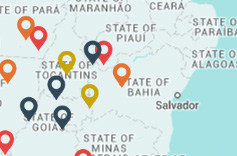Walking Metamorphosis Association of Users of Mental Health Services and their Families (AMEA)
Citizenship and madness, circulating rights: against prejudice and for social inclusion
Bahia
Amea’s mission is to promote social inclusion of people in mental distress for the affirmation of their human rights, calling for the realization of the rights of these people, guaranteed access to the several mental health services and the improvement of care in the Public Health System in Bahia. Liaising with other groups, the organization aims to fight discrimination and prejudice in order to restrain social and institutional violence.
Representatives of Amea participate in events held at educational institutions and government agencies, adding the theme “Mental Health” to the discussions.
Project
The 2010 project proposes a continuation of the actions developed by the project “Citizen Madness”, supported by the Brazil Fund in 2009. The idea is to expand networking activities to cities in the interior of Bahia, including the dissemination and distribution of the “Guide to Rights”, in order to strengthen the fight for the realization of human rights of mental health service users and their families.
The guidance of this audience, the reporting and monitoring of cases of violations, combined with critical reflection and mobilization regarding the rights already achieved are part of the activities. The group encourages participation in social monitoring of the functioning of public services and seeks to facilitate a permanent tool of communication for Amea.
Context
As the group shows, the ignorance of the majority of Bahia’s population about the reasons that have led to the closure of psychiatric hospitals, which is a violation of the users’ rights and an assault on their biopsychosocial integrity, is notorious. The Psychiatric Reform and its principles and guidelines, based on Law no. 10216/2001 are also under-disseminated. With the closure, which came from the reorientation of the attention model, the replacement services have not been adequately prepared to receive the people from the old mental asylums. In addition, there are many unattended people in mental distress, abandoned by family and society.
There is still negligence by the State, which may be seen as a subtle form of institutional racism, since the affected population is, at its absolute majority, composed of afro-descendants, people of low-income and from the outskirts of the cities.
Funding Line
Annual Call for Proposals
Year
-
Total Granted
-
Duration
-
Main Themes
Guaranteeing the rule of law and criminal justice






